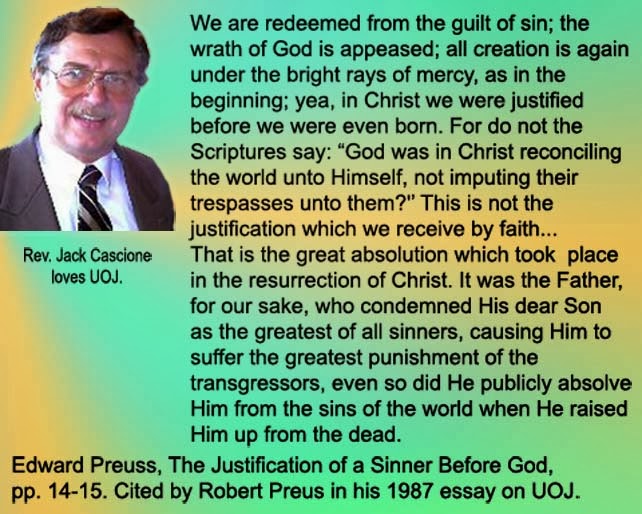THURSDAY, OCTOBER 17, 2013
Service Review
PLEASE WATCH THIS SERVICE, AND THEN ANSWER THE QUESTION: HOW APPROPRIATE IS THIS SERVICE FOR A CONGREGATION OF A CONFESSIONAL LUTHERAN CHURCH BODY?
http://www.ustream.tv/recorded/39808617
Video streaming by Ustream
POSTED BY INTREPID LUTHERANS AT 1:13 PM 0 COMMENTS 
3 COMMENTS:
- Joel said...
- Let's see, it's got a confession of sins, readings from God's Word, a sermon, prayers, the Lord's Supper, and hymns... Yep, Lutheran.
--Joel Lillo - OCTOBER 17, 2013 AT 5:32 PM
- Anonymous said...

- Don't Baptists have those as well? Since they do, I guess they're Lutheran as well?
Bryan Lidtke - OCTOBER 17, 2013 AT 6:29 PM
- Daniel Baker said...
- Let's see, it hasn't got the usual ceremonies (AC XXIV:1), it isn't celebrated with the highest reverence (XXIV 2), it doesn't have the Order of Lessons, (AC XXVI:40), series of prayers, vestments, and other like things (AP XXIV:1)... Nope, not Lutheran. At all.
- OCTOBER 17, 2013 AT 8:11 PM
- Joe Krohn said...
- I had problems with the works righteousness leanings that are typical of this paradigm as well as the overall casualness. I was quite turned off by the female lead vocal. A woman has no place leading worship. Period. It is clearly a violation of the created order which has no place in the church. Other than the keeping of Communion in the service (kudos for that), it could have been anywhere USA non denom church. And Daniel, even though I appreciate high church as much as you do, it is not compulsory.
- OCTOBER 17, 2013 AT 10:19 PM
- Anonymous said...

- Wow! Look at all these votes coming in all of a sudden for "Very Appropriate"!! -- Internet backbone between here and Waukesha must be glowing red hot. Who on earth is in Waukesha that is so insecure that little old irrelevant and insignificant IL would have them feeling so "competitive"? Maybe it's the same type of people who feel that in order to survive as a congregation they need to compete against Lutheran congregations that embrace their "catholicity" while competing with the sectarians for more members. --Franklin Brown
- OCTOBER 18, 2013 AT 8:55 AM
- Joel said...
- Franklin,
You live by the unscientific poll, you die by the unscientific poll. Given the audience of this blog, this poll was designed to make it look as if there were a lot of people who were offended by this type of Lutheran worship service. All I can say is: Turnabout is fair play.
--Joel Lillo - OCTOBER 18, 2013 AT 11:23 AM
- Joel A. Dusek said...

- True Mr. Brown. The trouble with Internet polls is that it's very difficult to restrict the responses to "one man, one vote" to get a real representation. (For you CW and NNIV femininnys, that's "man" in the old-fashioned generic sense). The poll is only as good as the integrity and honesty of the voters. I was vote 80 at about midnight and it was overwhelmingly "inappropriate". By 10 am it was what you see now. Intentionally skewed? Yeah.
- OCTOBER 18, 2013 AT 11:42 AM
- Anonymous said...

- I have two responses to the comments that have occurred since my last one.
1) Are we really going to vote for one so many times that it gets the results we want? It seems ver childish to me.
2) Joel, you never responded to Daniel or I (sic). I would love to hear what you think!
Bryan Lidtke - OCTOBER 18, 2013 AT 12:02 PM
- Daryl Meyer said...
- Perhaps the poll question would be better stated, "how appropriate is this church body for the confessional Lutheran?"
- OCTOBER 18, 2013 AT 1:01 PM
- Joseph Jewell said...
- Unbelievably immature. (Both the service and whoever flooded the voting overnight. Not even very subtle, but then the contempo advocates rarely are.)
A one-vote-per-IP policy wouldn't be a bad idea. It's still possible to beat that, but it takes a little more effort and is slower. A vote-with-your-name poll would be even better, but would of course get fewer responses.
It strikes me that the general trend in WELS these days seems to be geared towards the suppression of groups (even ephemeral groupings of folks on one issue) not created by the WELS itself, in response to the Time of Grace memorial last year, which of course acquired a long list of names and thus laid out in an un-ignorable way how big a problem that situation was. Now the policy is no more than three names on a memorial (unless, of course, it comes from a WELS committee like the TEC, and then the entire committee can be referenced), which has the effect of making "private" memorials appear to be the musings of a lone crank or a small minority, and I think also has the effect of reducing lay participation in the memorial process (if you can only put three names on your memorial, why "waste" one of them on a mere layman?)
Imagine how many signatures an anti-NIV2011 memorial would have gathered. I think it would have overwhelmed even the number that the Time of Grace memorial received, and it would have been an unmistakable signal to the convention delegates that they were not, in fact, required to choose from among only the options in the TEC's false dichotomy (i.e. would you like to approve NIV2011 only, or NIV2011 and some other stuff?) and that there was substantial support for that position. Instead we had a surfeit of anti-NIV2011 memorials, with only slight differences, each with just three signatures. Much less impactful and dilute--I have to hand it to whatever Machiavellian came up with the idea of limiting the signatures.
It is no coincidence that the powers-that-be eviscerated the grassroots memorial process in this way prior to pushing through the NIV2011 monstrosity. - OCTOBER 18, 2013 AT 1:47 PM











